
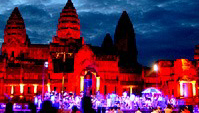
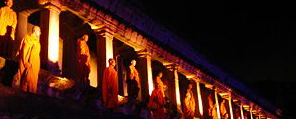
[01]. Invitation of the Gods
Our Bodhisatta (1) was born in Tusita Heaven (2) as a Deva (3) by the
name of Svetaketu. The Devas in Tusita Heaven were happy. The time had
come for the Bodhisatta to be born in the world for the last time. The
Devas invited the Bodhisatta to be born on earth.
The Bodhisatta looked down at the world to make sure that the five requirements necessary for His final birth in the world were met. These five requirements are as follows:
1. The right time - The life span of human beings at a time a Buddha is born is between 100 and 100,000 years. If the life span is very short, human beings want to enjoy their short life to the fullest and tend to be very fond of material things. If the life span is very long, they tend to forget the impermanence of life. At this time the Bodhisatta found that the life span was one hundred and twenty years.
2. The right continent - All Buddhas are born in India (known as Jumbudipa at the time of the Buddha). This is because the people of India are spiritually more advanced than people in other countries, and so are more ready for a Buddha.
3. The right area - The city of Kapilavatthu was chosen as the city of the future Buddha, as there was a just and good king and many righteous people living there.
4. The right caste - A Buddha is always born in a high caste - Either a royal caste or a priestly caste. This is necessary, as often persons born in a low caste are not accepted by society.
5. The right mother - The mother of a Buddha has to be very pure. She is a person who has resolved to be a mother of a Buddha and observed the five precepts for many countless past lives. The chosen mother was Queen Mahaa Maayaa, wife of King Suddhodana of Kapilavatthu.
The Bodhisatta saw that the five requirements were met.
--------------------------------------------------------------------------------
(1). Bodhisatta - One on his way to perfection. This is the name given to a person who is trying to be a Buddha.
(2). Tusita Heaven - One of the seven happy planes of life. The Devas in the Tusita Heaven have a life span of 576,000,000 human years. All Bodhisattas who have completed the ten perfections await the right time for their last birth in Tusita Heaven. The next Buddha, the Maithreya Buddha, is at present a Deva by the name of Natha in the Tusita Heaven.
(3). Devas - Heavenly beings known in English as gods or divine beings.
The Life of the Buddha
Prepared by
Ven.Vodano Sophan
The essay written By
Radhika Abeysekera
This book is for free distribution only.
This book is dedicated to my mother
and father,
Mrs. S. Seneviratna and the late Mr. D. A. Seneviratna.
They made this book a possibility by giving me a Buddhist upbringing.
May they attain Nibbaana.
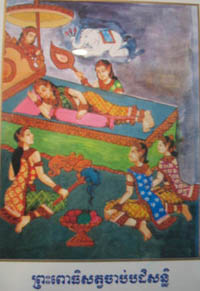
[02]. Queen Mahaa Maayaa's dream
One night Queen Mahaa Maayaa had a dream. She dreamt that the Devas from
the four directions of the earth took her to Lake Anotatta on top of the
Himalayan mountain. She was bathed in the lake and dressed in heavenly
clothes and ornaments. A white baby elephant carrying a white lotus flower
in its trunk trumpeted, and after circling around her three times, entered
her body.
The next morning she told King Suddhodana of her dream. He consulted some wise men who, on hearing the dream said, "The Queen will have a wise and noble baby boy." The king and queen were very happy for they had no children and were longing for a child.
According to the custom of that time, Queen Mahaa Maayaa decided to visit her mother so that she could be with her at the time of the birth of her baby.On the way she stopped at the Lumbini Pleasure Garden to rest. Under a sweet-scented Sal tree, on a full moon day in the month of May, in the year 623 B.C., the Prince was born. The baby Prince took seven steps, and a lotus flower burst through the ground to receive His feet. He made the following announcement:
"Aggo hamasmi
lokassa - "I am the Chief in the world
Jettho hamasmi lokassa - There is no equal to me
Settho hamasmi lokassa - I am Supreme
Ayamanthima jathi - This is my last birth
Natthi dani punabbhavo. - " No rebirth for me."
It is said in the Anagata Vamsa that the next Buddha, Maithreya, will make a similar announcement at His birth.
The ministers took the Queen and the baby back to Kapilavatthu and King Suddhodana. Many wise men came to see the baby. They said that one day the Prince would either be a King of the world or a Supreme Buddha. The baby Prince was named Siddhaartha Gotama. Siddhaartha means "wish fulfilled" and Gotama was His family name. Seven days after the birth of the Prince, Queen Mahaa Maayaa died. She was born as a Deva by the name of Matu-deva putta in the Tusita Heaven. Her sister, Mahaa Prajaapathi Gotami, took care of the Prince.
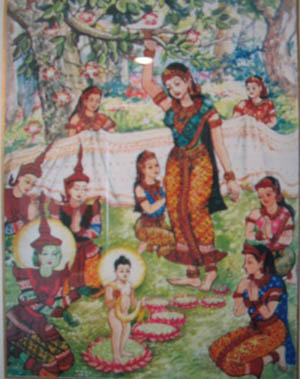
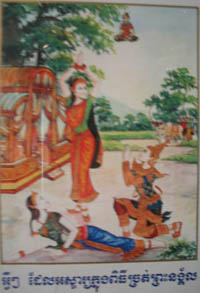
[04]. Ploughing festival
Every year there was a big festival at the time the rice fields were ploughed.
One day King Suddhodana took the little Prince to the ploughing festival.
The Prince fell asleep. Seeing that the Prince was sleeping, His maids
joined in the festivities of the day.
When they came back they found the Prince deep in meditation. He was meditating on His breathing in and breathing out. This meditation is known as breathing meditation (Aanaapaana Sati Meditation). This form of meditation is very important, as it was this meditation that was later used by the Buddha to attain enlightenment (*).
(*) enlightenment - the supreme knowledge that leads to the end of rebirth.
The Prince grew up to be a kind and gentle boy. One day He was walking in a grove when a swan that had been shot down fell near Him. The Prince picked up the swan, pulled out the arrow, and placed some soothing herbs on its wound. He then carried it back to the palace. His cousin, Devadatta, ran after Him to claim the bird, as it was he who had shot it down. Prince Siddhaartha refused to give Devadatta the bird.
Devadatta, angry at not getting the bird he had shot, complained to King Suddhodana. After listening to the young Princes, the King decided to have their dispute settled in court. At first the jury were angry that a children's petty dispute should be brought to court. However, King Suddhodana insisted on their settling the dispute saying, "These are our future rulers. It is best that this should be settled in court."
Devadatta gave his side of the story first, saying that he had shot down the bird, and that as such, the bird belonged to him. Prince Siddhaartha agreed that it was Devadatta who had shot down the bird, but said that it was He who had saved its life by applying soothing herbs. Prince Siddhaartha said, "If the bird had died, then it would have belonged to you. I saved its life by attending to it. Life belongs to the saviour of life, not to the destroyer."
After listening to Prince Siddhaartha's defence, the jury agreed with him that life belongs to its saviour, not to its destroyer. The bird was given to Prince Siddhaartha.
The Prince grew up in luxury. He was a good student, obedient, kind and generous. The gentle Prince was liked by all.
It was time for the Prince to be married. Prince Siddhaartha chose His own cousin, Princess Yasodharaa, as His bride. She too, wanted to marry Him.
At first Princess Yasodharaa's father, King Suprabuddha, did not want his daughter to marry Prince Siddhaartha. He knew that some wise men had said that one day the Prince would give up His wealth and royal position and become a Buddha. He did not want Prince Siddhaartha to give up his daughter and kingdom. However, Princess Yasodharaa wanted to marry Him and no other. The Prince and Princess were married with great ceremony. Both Prince Siddhaartha and Princess Yasodharaa were sixteen years old at the time of their marriage. They were very happy together.
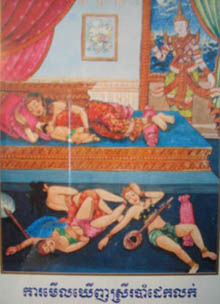
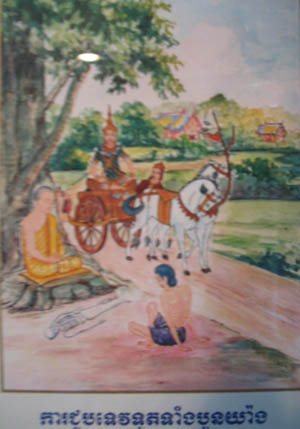
The Prince and Princess led an idyllic life together. King Suddhodana made sure that they had every luxury. He did not want the Prince to see or feel any sorrow, for he did not want Prince Siddhaartha to give up His kingdom and become a Buddha. King Suddhodana wanted his son to be the next king.
One day when the Prince was out riding with Channa, His charioteer, He saw a very old man. The man was very feeble, hunched over, and could hardly walk. Having never seen old age before, the Prince inquired from Channa as to what had happened to the man. He then found out from Channa about old age and that it would someday happen to all of us. The kind-hearted Prince was very sad and thoughtful about this new-found information.
On another day when He was out with Channa He saw a very sick man in great pain. The Prince, who had never seen such grave sickness, inquired from Channa as to what was wrong with the man. He was even sadder when He heard about sickness and pain and that it could happen to anyone.
The Prince was again out with Channa when He saw the funeral of a man. The dead man's friends and relatives were crying and carrying him for his burial. Having never faced death before, the young Prince was horrified to find that death was something we all had to face.
For many days the young Prince was disturbed by these sights: Old age, Sickness, and Death, common to all living beings. "Was there any way he could stop this life of old age, sickness and death that all mankind had to face? Was there any way that he could deliver mankind from pain and sorrow?" The young Prince pondered these questions.
The sad and thoughtful Prince was again out with Channa when He saw an ascetic, a person who had renounced the world and all his belongings and taken the life of a monk. What serenity, what peace of mind! The ascetic's face looked calm, free from worries. This, then, must be the answer, thought Prince Siddhaartha. He made up His mind to give up all of His wealth and kingdom to become an ascetic. He decided that He wanted to find a way to end this sorrow of old age, sickness and death, so that He could help mankind.
Prince Siddhaartha was twenty-nine years old. It was a full moon day in the month of July. The Prince had decided that this was the day when He would leave the palace and become an ascetic, when the news came that Princess Yasodharaa had given birth to a baby boy. The first word that the Prince said when he heard of the birth of His son was "Raahu". Raahu means an obstacle. The baby prince would make Prince Siddhaartha's decision to leave the palace and His loved ones even more difficult. An obstacle to His leaving had arisen. The baby was named Raahula, by his grandfather.
Prince Siddhaartha went to His wife's sleeping chamber to look at her and His new-born son. Both were asleep. The princess's hand was covering the baby's face. The Prince knew that His wife would wake up if He tried to move her hand to see the baby's face. It would then be very difficult for Him to leave. "I must leave quietly and find a way to end this recurring life of old age, sickness, and death," thought the Prince. "I must find this happiness for mankind, my wife, and son. Then I will come back to see my son."
The Prince took one last look at His beloved wife and son. He then called Channa, His charioteer, and left the palace on His horse Kanthaka. He crossed the river Anomaa and handed all His jewellery and rich clothes to Channa. He asked Channa to take them back to His family and tell them that He had gone to find a way to end death.
The Deva king Sakka handed Him the robes and bowl of an ascetic. His faithful horse Kanthaka did not want to leave Him. The sorrow of parting was too great for it. Kanthaka died of a broken heart and was born as a Deva in the Taavatimsa Heaven (1). Channa went back to break the news of the Great Renunciation to the king. After the renunciation Prince Siddhaartha was known as the ascetic Gotama.
All Bodhisattas must be married and have a child in their last birth before enlightenment. It has been so with all the Buddhas of the past and will be so with all the Buddhas of the future. Otherwise, because a supreme Buddha is such a perfect being, so God-like, He would be mistaken for a God (Brahma). They in the Brahma world (2) do not marry. The Buddha, however, is above all Gods. He is the perfect being, teacher of Gods and humans, and incomparable.
(1). Taavatimsa Heaven - One of the seven happy planes of life also known as the Heaven of the thirty-three Devas. It was in this Heaven that the Buddha taught the Higher Teachings (Abhidhamma) for three months.
(2). Brahma world - There are sixteen happy planes of life where the beings have pleasures, but not the pleasures of the senses. Usually, those who have achieved the spiritual levels of the mental absorptions (Jhaanas) are born in these planes of life.
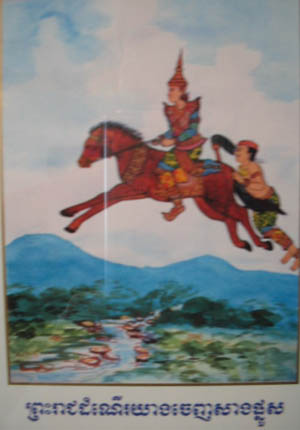
Copyright ©August, 2003 Khmer-Canadian Buddhist Cultural Centre.
All Rights Reserved (unless otherwise stated).
Started: Wed, August 13, B.E.2547,A.D.2003, Last Updated: May 7, B.E.2547, A.D.2004